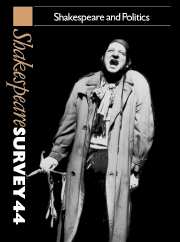Book contents
- Frontmatter
- Shakespeare and Politics
- Language, Politics, and Poverty in Shakespearian Drama
- Some Versions of Coup d’état, Rebellion and Revolution
- Woman, Language, and History in The Rape of Lucrece
- Love in Venice
- Two Kingdoms for Half-a-Crown
- ‘Fashion it thus’: Julius Caesar and the Politics of Theatrical Representation
- ’Demystifying the Mystery of State’: King Lear and the World Upside Down
- Tragedy, King Lear, and the Politics of the Heart
- The Politics of Shakespeare Production
- Shakespeare in the Trenches
- Shakespeare’s Earliest Editor, Ralph Crane
- Shakespeare’s Falconry
- Telling the Story of Shakespeare’s Playhouse World
- Shakespeare Performances in England, 1989–90
- Professional Shakespeare Productions in the British Isles January-December 1989
- Critical Studies
- Shakespeare’s Life, Times, and Stage
- Editions and Textual Studies
- Books Received
- Index
’Demystifying the Mystery of State’: King Lear and the World Upside Down
Published online by Cambridge University Press: 28 March 2007
- Frontmatter
- Shakespeare and Politics
- Language, Politics, and Poverty in Shakespearian Drama
- Some Versions of Coup d’état, Rebellion and Revolution
- Woman, Language, and History in The Rape of Lucrece
- Love in Venice
- Two Kingdoms for Half-a-Crown
- ‘Fashion it thus’: Julius Caesar and the Politics of Theatrical Representation
- ’Demystifying the Mystery of State’: King Lear and the World Upside Down
- Tragedy, King Lear, and the Politics of the Heart
- The Politics of Shakespeare Production
- Shakespeare in the Trenches
- Shakespeare’s Earliest Editor, Ralph Crane
- Shakespeare’s Falconry
- Telling the Story of Shakespeare’s Playhouse World
- Shakespeare Performances in England, 1989–90
- Professional Shakespeare Productions in the British Isles January-December 1989
- Critical Studies
- Shakespeare’s Life, Times, and Stage
- Editions and Textual Studies
- Books Received
- Index
Summary
King Lear is very much a political play–that is a play concerned with power and government in the state, with public and civil life, and not solely with private relationships and passions. Of course it is not only political; but it seems necessary to restate the point because recent productions so often try to make it a purely personal, familial, and psychological drama (much in the manner of A.C. Bradley, though a Bradley who has read Freud, Laing, and Foucault). However, even if this is intended to render the play acceptable to modern audiences (who are assumed to be very simple-minded), it is still a distortion, and makes much of the action unintelligible. As Peter Brook put it, the fact that the play is called King Lear does not mean that it is primarily the story of one individual –or, one may add, of one family. Shakespeare himself, by introducing the Gloucester parallel plot from quite another source, seems concerned to generalize the issues, to show that Lear’s personal psychology or ‘character’ is not the only force at work.
There was a period, of course, when an exclusively timeless, ahistorical way of reading was more or less taken for granted. It was a great illumination for me, then, to read studies like John Danby's Shakespeare's Doctrine of Nature (1949), and the chapters by Kenneth Muir and Arnold Kettle in Shakespeare in a Changing World (1964), which attempted to read the play in the light of its contemporary historical and political significance, whatever reservations one may now have about some of their particular interpretations. Many years later, when my own highly intelligent and dominating mother reached the age of eighty-six, my sister and I discovered in ourselves marked Goneril and Regan tendencies. In one sense, as Goethe has it, 'an old man is always a King Lear'.
- Type
- Chapter
- Information
- Shakespeare Survey , pp. 75 - 84Publisher: Cambridge University PressPrint publication year: 1991



